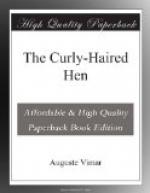Mother Etienne, busy giving green apples to the pigs, bran to the rabbits, and corn to the pigeons, came back presently, and could not see the big Yollande beside the pond, only her children floating far, far away on the water. Surprised she drew nearer, called, but in vain. The mother-hen had disappeared. Then only did she understand the tragedy that had occurred. She called for help. Petit-Jacques immediately opened the big sluice and the water ran out, but much too slowly for their impatience. At last they began to see the bottom, and soon the body of poor Yollande was discovered stiff and motionless.
There was general consternation at the farm. Petit-Jacques, by means of a long pole, seized her and drew her to land at Mother Etienne’s feet. Labrie came up and sniffed sadly at the body of the unhappy hen. In vain they dried her and rubbed her,—nothing did any good.
“She’s quite dead, alas,” said Mother Etienne with tears in her eyes, “but it was my own fault. I ought to have closed down the lattice and this misfortune would not have happened. It really is a great pity—such a fine hen. She weighs at least eight pounds. There, Germaine, take her and weigh her.”
Germaine was the maid and also the cousin of Petit-Jacques—of whom she was very fond. She was a fine buxom girl of eighteen, strong and well-grown. She loved animals, too, but her feeling for them could not be compared to Mother Etienne’s.
“Germaine, take away poor Yollande, I am quite upset by this trouble. You will bury her this evening, in a corner of the kitchen-garden—deep enough to prevent any animal digging her up. I leave it to you—do it carefully.”
The girl bore away the fine hen in her apron. “How heavy she is—it is a shame,” and blowing apart the feathers, she saw the skin underneath as yellow and plump as you could wish. Mechanically she plucked a few feathers.
“After all,” she said, “it isn’t as though she had died—she was drowned, quite a clean death; she’s firm and healthy, only an hour ago she was as strong and well as could be. Why shouldn’t we eat her?—We’ll stew her because, though she is not old, she is not exactly in her first youth—but there’s a lot on her—with a dressing of carrots and nutmeg, a bunch of herbs and a tomato, with a calf’s foot to make a good jelly, I believe she’d make a lovely dinner.”
Saying this she went on plucking Yollande. All the feathers, large and small, gone, a little down was left, so to get rid of this she lit an old newspaper and held her over it.
“Madame won’t know anything and will enjoy her as much as we shall. There’s enough on her for two good meals.”
Quite decided, instead of burying her, she wrapped the future stew carefully in a perfectly clean cloth and put it on a shelf in the kitchen out of the way of flies or accident.




